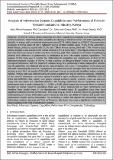Analysis of Information Systems Capabilities and Performance of Firms in Telecommunications Industry, Kenya
Publication Date
2018-04-25Author
Bett, Alfred K
Obura, Johnmark
Oginda, Moses
Metadata
Show full item recordAbstract/
In the 21stcentury where economies are driven majorly by knowledge and information-based service businesses, telecommunication industries are playing a critical economic role both regionally and globally. In Kenya, with a combined subscription rate of 37.8 million based on a 2016/17 Communication Authority of Kenya report of 2017, Safaricom Kenya Limited controls about 71.2% of the subscribers, Airtel Kenya Limited is second with 17.6% with Telkom Kenya coming third with 7.4%. Finserve East Africa (Equitel) a new entrant in the market controls 3.8% of subscribers. These figures points to the fact that only Safaricom seems to be the only firm performing well. This reality forms the basis of establishing whether their difference in performance is attributable to their information systems capabilities.The purpose of this study was toanalyse the relationship IS capabilities and performance of firms in the telecommunications industry in Kenya.It was anchored on Resource-Based Theory and guided by a conceptual framework with the dependent variable being firm performance while independent variable was IS capabilities. Correlational and surveyresearch designs were used.The population of the study was 408 staff comprising all executive, management and operational level managers from the business and IT sections in each firm. A sample of 202 staff was drawn through proportionate stratified random sampling method. Primary data was collected using structured questionnaire and an interview schedule. Reliability of the research instrument was tested against Cronbach’s alpha coefficient where areliability score of 0.814 was achievedwhile validity was gauged through research experts’ opinions. Data was analysed using both descriptive and inferential statistics. The findings established that IS capabilities and firm performance have a weak relationship (r = 0.409, p<0.05) which means that whenever firms in industry invested on market based IS capabilities there was a small improvement on their performance and therefore firms should invest in the development of market based IS capabilities since they have significant influence on their performance. This study may be useful to industry players by gaining better understanding on various information system resources that they can utilize to improve and sustain their performance besides policy formulation. By advancing a model that depicts the relationship between information systems resources and firm performance, this study may make a significant contribution to theory building in the field of information systems
Collections
- Department of Botany [232]

